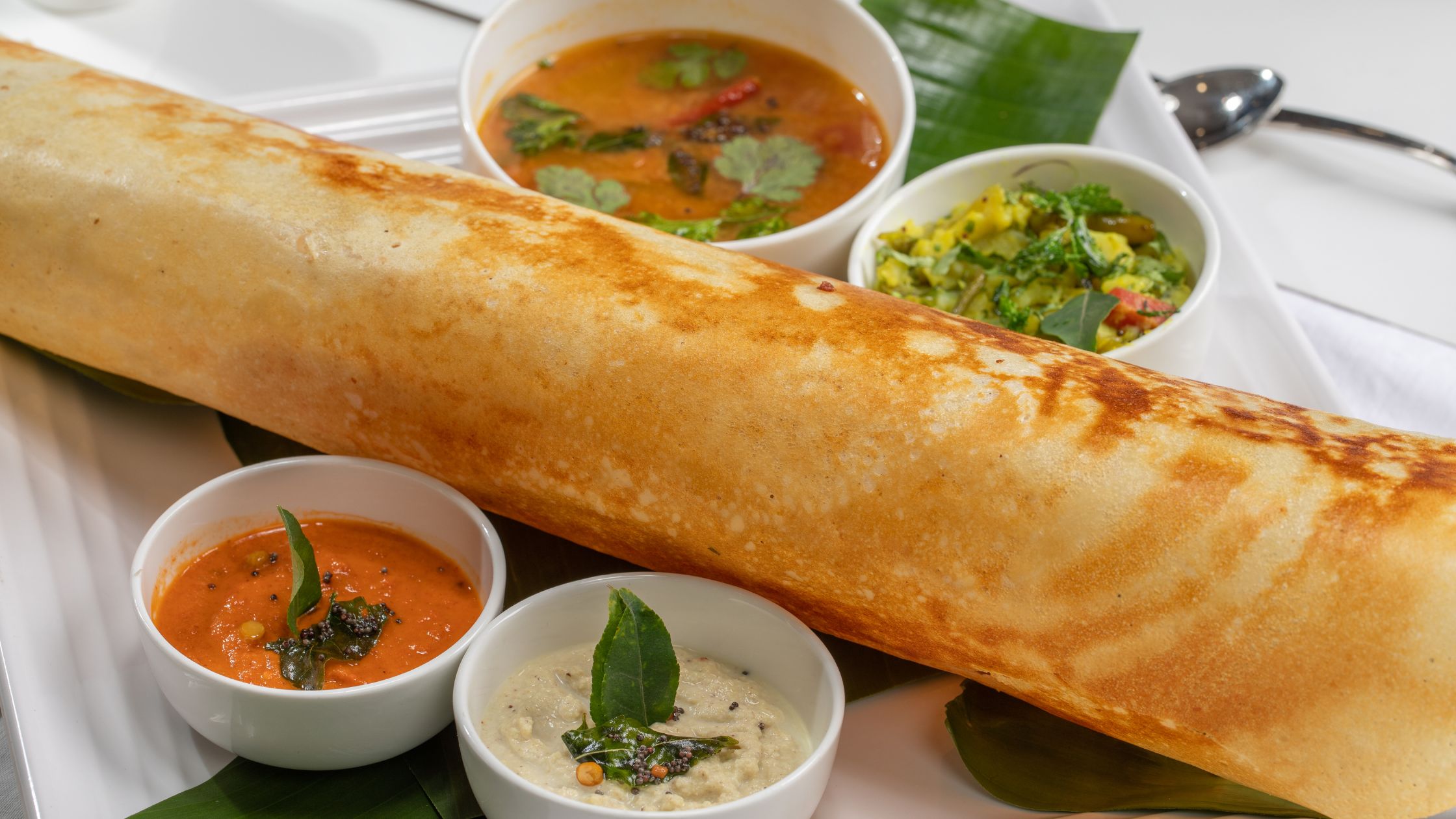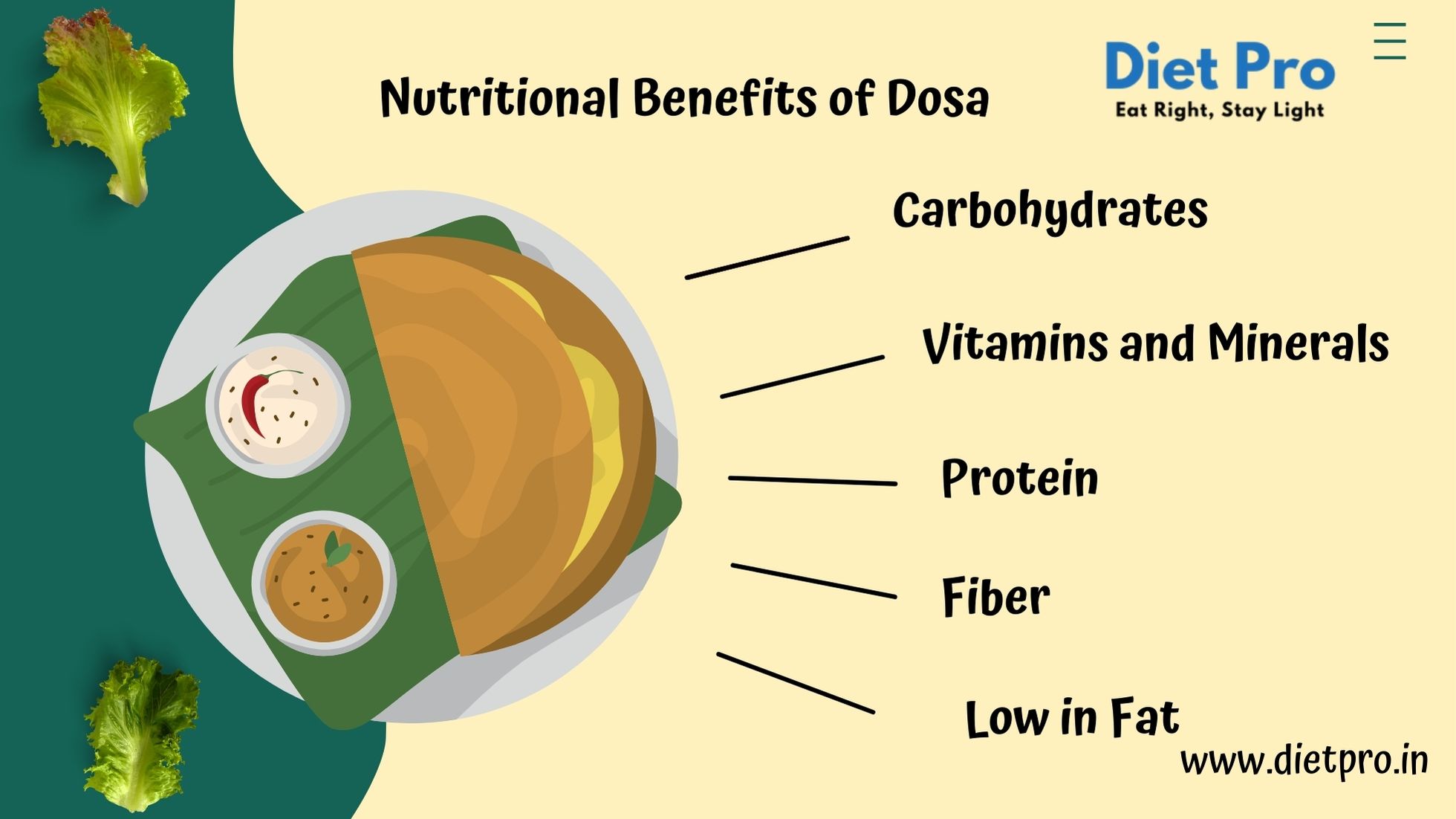Dosa, a popular South Indian delicacy, has gained worldwide recognition for its unique taste and versatility. Whether you enjoy it as a crispy, paper-thin treat or a soft, fluffy creation, dosa is a beloved dish that appeals to people of all ages. But, have you ever wondered about the nutritional content of dosa? In this blog, we will explore the Calories in Dosa count and other nutritional aspects of this delicious dish.
The Basics of Dosa
Dosa is a traditional South Indian pancake made from fermented rice and urad dal (split black gram). The batter is allowed to ferment overnight, resulting in a light and fluffy texture. It is typically cooked on a griddle or skillet until it becomes golden brown and crispy. Let’s discuss about Calories in Dosa.
Calories in Dosa
The calorie content of a dosa can vary depending on its size, thickness, and ingredients. Here’s a breakdown of the approximate calorie count in different types of dosas:
- Plain Dosa: A standard plain dosa, which is about 85-90 grams in weight, contains approximately 100-120 calories. This figure may increase slightly if you use more oil or ghee for cooking.
- Masala Dosa: A masala dosa, stuffed with a spiced potato mixture, can contain around 200-250 calories, again depending on its size and the amount of oil or ghee used.
- Rava Dosa: Rava dosa, made with semolina, tends to be slightly higher in calories compared to plain dosa, with an average calorie count of 150-200 calories per dosa.
- Ghee Roast Dosa: This rich and indulgent dosa, prepared by generously smearing ghee on the griddle, can have up to 300 calories or more due to the added fats.
- Onion Dosa: An onion dosa is often made by mixing chopped onions into the dosa batter. It contains approximately 120-150 calories per dosa.

How Many Calories Does One Dosa Have?
The number of calories in one dosa can vary depending on its size, thickness, and the ingredients used. However, on average, a plain dosa made from fermented rice and urad dal (split black gram) that weighs approximately 85-90 grams contains approximately 100-120 calories.
Calories in Masala Oats
Approx Value 1 dosa calories with nutritional facts
|
Calories |
168 |
|
Total Carbohydrates |
29g |
|
Dietary Fibre |
0.9g |
|
Sugars |
0.1g |
|
Total Fat |
3.7g |
|
Polyunsaturated Fat |
0.6g |
|
Monounsaturated Fat |
2.6g |
|
Saturated Fat |
0.5g |
|
Trans Fat |
0g |
|
Cholesterol |
0g |
|
Protein |
3.9g |
|
Sodium |
94mg |
|
Potassium |
75mg |
It’s important to note that this is a rough estimate, and the actual calorie content of a dosa can vary based on factors such as the size of the dosa and the quantity of oil or ghee used during cooking. If you’re concerned about the exact calorie count, it’s a good idea to measure the ingredients and cooking oil precisely and use a reliable nutritional calculator to get a more accurate estimate for your specific dosa recipe.
It’s important to note that these calorie estimates are rough averages and can vary based on factors such as the size of the dosa and the quantity of oil or ghee used during cooking. If you are calorie-conscious, consider using minimal oil or opting for healthier cooking alternatives like non-stick cookware.
Nutritional Benefits of Dosa
Beyond calories, dosa also offers several nutritional benefits:
- Carbohydrates: Dosa is primarily a source of carbohydrates, providing energy to fuel your daily activities.
- Protein: Urad dal used in dosa batter is a good source of plant-based protein, making dosa a decent protein-rich option for vegetarians.
- Fiber: Fermentation increases the fiber content of dosa, aiding in digestion and promoting gut health.
- Vitamins and Minerals: Dosa contains essential nutrients such as B vitamins, iron, calcium, and magnesium, which are vital for overall health.
- Low in Fat: When cooked with minimal oil, dosa is relatively low in fat, making it a healthier choice compared to deep-fried snacks.
- Probiotics: The fermentation process in dosa batter promotes the growth of beneficial probiotic bacteria, which can support gut health.

What you think Is Dosa Good for Weight Loss?
Dosa can be a part of a weight loss-friendly diet when consumed in moderation and prepared using healthier cooking methods. Here are some factors to consider when including Calories in Dosa in your weight loss plan:
- Portion Control: Pay attention to the portion size. Consuming excessively large dosas or eating multiple dosas in one sitting can contribute to excess calorie intake, which is not conducive to weight loss.
- Cooking Method: Opt for healthier cooking methods. Traditional dosas are cooked on a griddle or skillet with minimal oil or ghee, making them a better choice than deep-fried options. Use non-stick cookware to further reduce the need for added fats.
- Fillings and Accompaniments: Be mindful of the fillings and accompaniments you choose. Plain dosa with a variety of vegetable-based fillings, like sautéed spinach or mixed vegetables, can be a nutritious choice. Avoid overly oily or calorie-dense fillings like potato masala.
- Fermentation: The fermentation process involved in making dosa batter can increase its nutritional value. Fermented foods can be beneficial for gut health and digestion, which can indirectly support weight management.
- Balanced Diet: Incorporate dosa into a balanced diet that includes a variety of foods from all food groups. Combine dosa with sources of lean protein, plenty of vegetables, and healthy fats to create a well-rounded meal. Calories in Dosa.
- Watch the Sides: Be cautious with high-calorie side dishes like coconut chutney, which can add extra calories to your meal. Opt for smaller portions or healthier alternatives if you’re trying to lose weight.
- Mindful Eating: Pay attention to your hunger and fullness cues. Eating slowly and mindfully can help you recognize when you’re satisfied and prevent overeating.
- Read More :- Calories and Carbs in Alcohol
- Read More :- Benefits of eating Cucumber at Night
Conclusion
Dosa is not only a delightful treat for your taste buds but also a decent source of nutrition. While calorie counts can vary, Calories in Dosa can fit into a balanced diet when prepared with moderation in mind. Incorporating dosa into your meals can provide a range of nutrients while satisfying your cravings for a delicious and wholesome meal. Remember to pair your dosa with a variety of chutneys, sambars, and vegetable fillings to enhance its nutritional value. Enjoy your dosa while savoring its rich flavors and nourishing goodness!
